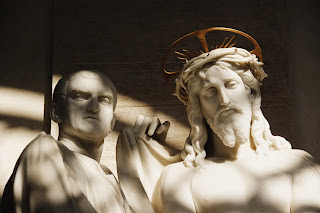Holy Week 2023- Saturday
Holy Week- Saturday
Pontius Pilate was the Roman governor of Judaea from 26-37AD.
An inscription at Caesarea Maritima gives the technical title of his position
as praefectus Iudaeae, prefect of Judaea, the leader of
500-1,000 troops. His position involved leading all the military, financial,
and judicial responsibilities for the area.
History portrays Pilate as a cruel tyrant who had a hatred for the Jews
and their beliefs and customs. He was the first Roman prefect to bring images
of the emperor into Jerusalem. The Jewish people sent a delegation to Caesarea
and pleaded with Pilate for five days to remove the images from the city. On
the sixth day, Pilate sent soldiers into the crowd. At his signal, they were to
draw their swords and cut the Jews to pieces if they did not allow Caesar’s
image. The Jews fell down together and exposed their necks, for they would
rather die than transgress their law. Pilate, not desiring a revolution,
decided to remove the images from Jerusalem. (Josephus, Jewish War)
Pilate was finally removed from
office over his treatment of a group of Samaritans who were beaten and either
killed or imprisoned by a group of Roman soldiers. Pilate then executed the
most prominent men of the group. When the Samaritans appealed to the prefect of
Syria, Pilate was ordered to appear before the emperor. Nothing is known about
what happened to Pilate in Rome, but he never returned to his position. Many
scholars believe that he was most likely exiled to France.
The Gospel narratives gives us the
picture that Pilate could be easily swayed. It seems to be the case in the
instance of Jesus. It could be that Pilate so feared losing his position that
he allowed the Jews to continue. Regardless, Pilate called for the execution of
Jesus at the request of the priests and the people.
After questioning Jesus, and seeing
Jesus not trying to defend himself, Scripture says that Pilate was “astonished”.
There are probably very few people that Pilate has questioned that have not
been shaking with fear and proclaiming their innocence. I’m guessing that the
number is zero. There’s no one who would not beg and plead to be released from
the horrible death that awaited them. Yet this Jewish Rabbi seems to have calmly
accepted His fate, even when accusations and stories against Him didn’t add up.
The Gospel of Matthew records that
Pilate would often release a prisoner at the Passover feast. Because Pilate
found nothing in Jesus deserving of death, he gave the crowd a choice of
releasing either Jesus or a murderer named Barabbas. Surely between the choice
of these two, a murder and a beloved Rabbi, the crowd would choose Jesus,
right? Just a few days ago, the city was buzzing with news that Jesus was coming
to Jerusalem? There were cries of, “Hosanna to the Son of David” and “Blessed
is He who comes in the name of the Lord!” This is the prophet who brought a man
back from the dead! Surely, they will choose Jesus?! But Pilate watched as the
crowd turned against the Great Teacher and Healer.
Being warned by his wife because of
a troubling vision she had about Jesus, Pilate sought to stay neutral in the whole
affair. Proclaiming his innocence of Jesus’ fate, he publicly calls for water, washes
his hands of Jesus, and hands Him to the executioners.
But this doesn’t work. Pilate can’t
simply take some soap and water stay out of the situation. Pilate is as guilty
as Judas, the chief priests, the crowds, and even the disciples. Not only
because of his role in the affair, but because of his sin.
The official charge against Jesus
is sedition, rebellion against the empire. They crucify Jesus, not because he
offends the Jewish leadership, but because He claims to be the King of a
greater Kingdom. And this Kingdom stands in direct opposition to the kingdoms
of the world. The kingdoms of this world hold their subjects accountable for
their laws, and violation of those laws call for swift justice. This is also
true for the Kingdom of God, but the Kingdom of God rules all the kingdoms of
the world. Scripture tells us that all mankind has rebelled against God’s
Kingdom and His rule and this rebellion must be punished and dealt with.
When Pilate condemns Jesus to His
death, he is fulfilling the redemptive plan of God. Jesus will pay the penalty
for the sin of the world. Not only for the Jews, but for people of all nations
who will call upon Christ for salvation. But this payment is not effective
unless it is applied by repentance and belief.
This weekend we celebrate Christ’s
payment for sin, but have you personally applied that payment to your sin? Have
you made Christ’s sacrifice effective for your rebellion against His Kingdom
and rule? His mercy is available to all rebels and tyrants who willingly call
upon Jesus for rescue.






Comments
Post a Comment